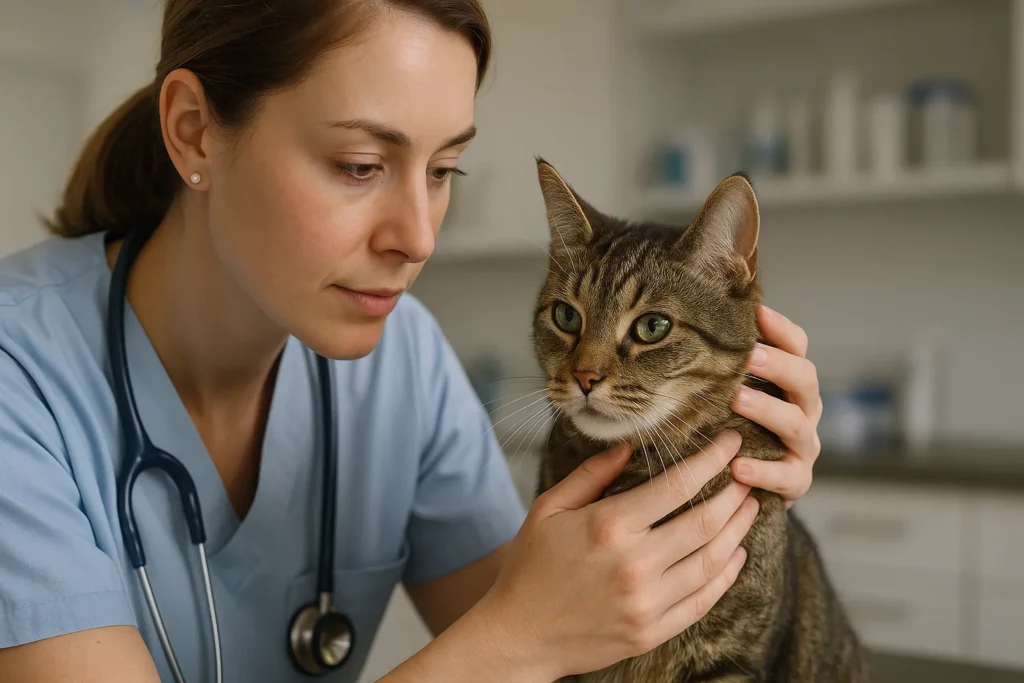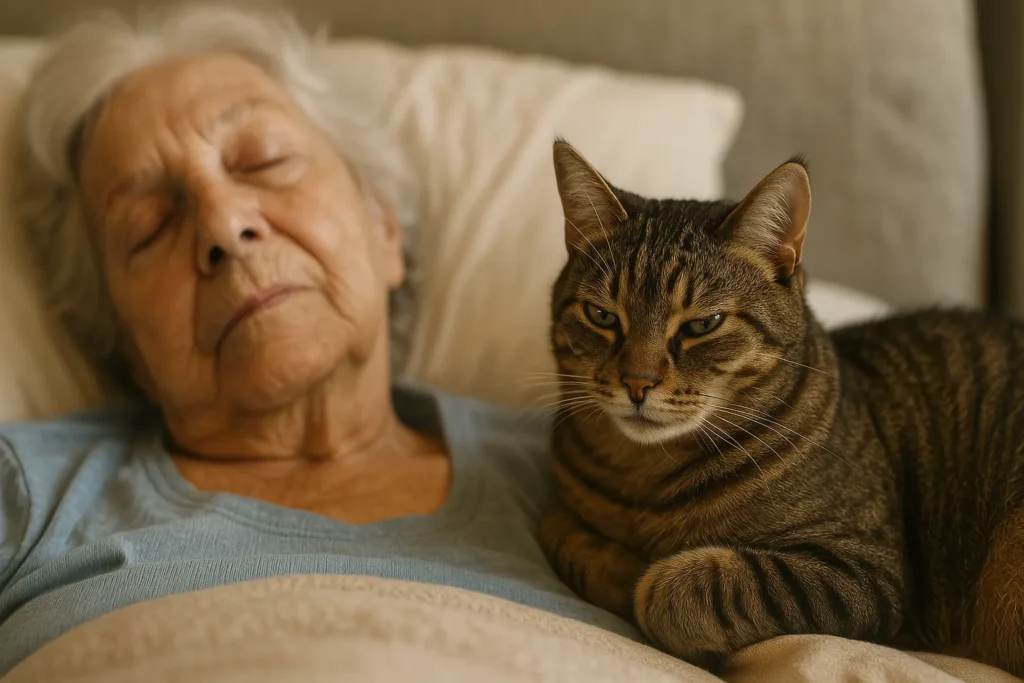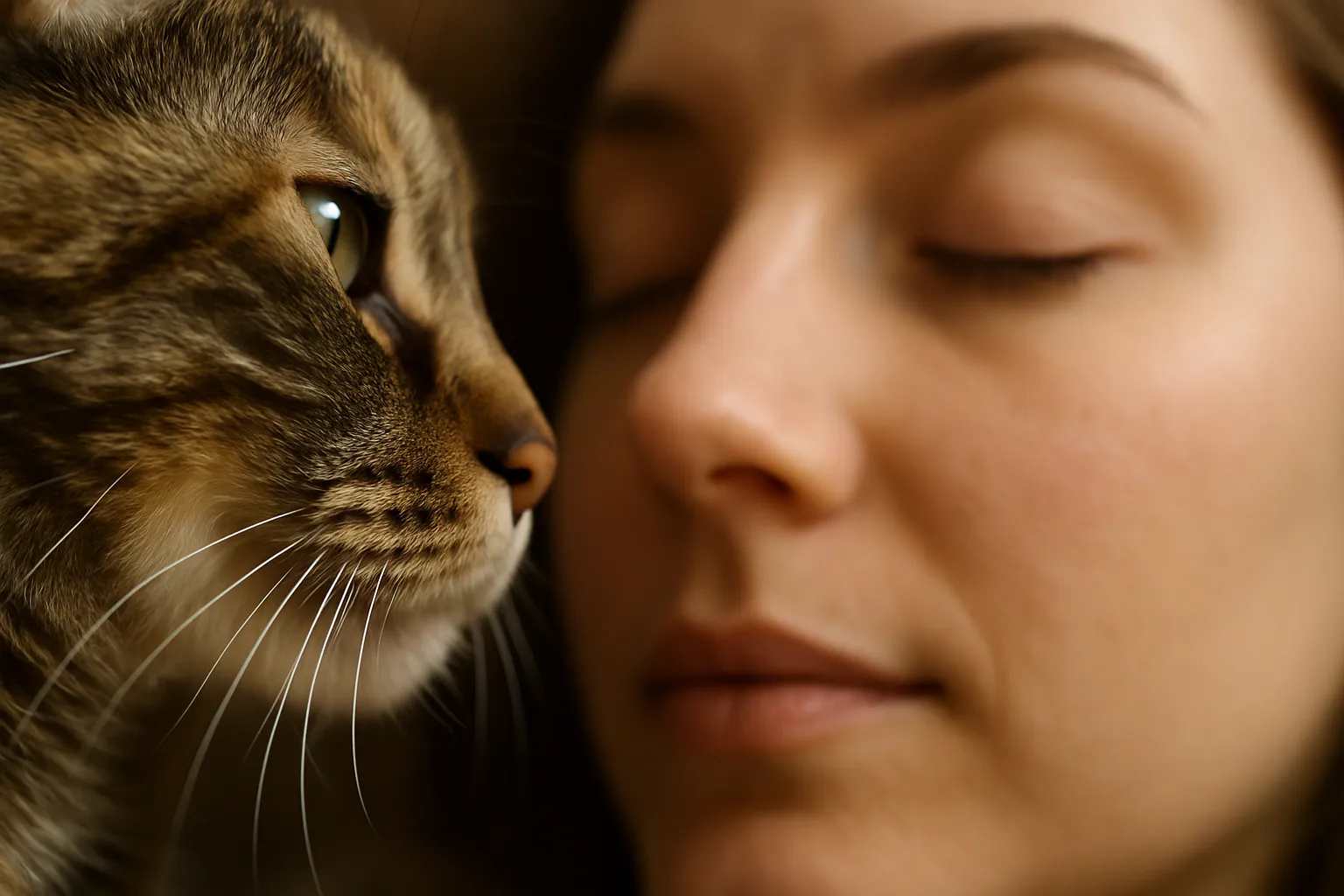Your Cat Might Be a Furry Little Healer… or at Least a Fuzzy Alarm System
If you’ve ever had your cat suddenly become extra clingy when you’re under the weather, you’re not alone. From curling up on your chest when you have a cold to meowing at you relentlessly before you even know something’s wrong, it’s enough to make any cat owner wonder: Can cats detect illness in humans?
While science hasn’t yet handed over a purr-signed certificate of diagnosis, there’s a growing pile of stories, and some pretty compelling expert opinions, that suggest cats may have a special way of tuning in to our health.
Let’s explore what the science, vets, behaviorists, and everyday cat parents have to say about it.
What the Research Says (and Doesn’t Say)
Let’s get this out of the way: there’s no definitive scientific proof that cats can detect illness in humans. Unlike dogs, which have been studied extensively for their ability to sniff out diseases like cancer or diabetes, cats have mostly stayed out of the laboratory limelight.
But that doesn’t mean the potential isn’t there.
Cats have a powerful sense of smell. While estimates vary, they’re believed to have around 200 million scent receptors, compared to our paltry 5 million. Dogs may have more, but cats have a different kind of olfactory superpower, especially when it comes to picking up on pheromones and subtle chemical changes in their environment.
So, while cats haven’t been formally trained to detect diseases (yet), researchers and vets agree: they probably could.

Experts Weigh In: Vets and Doctors on Feline Health Detection
Veterinarians regularly hear from pet parents who say their cat “just knew” they were sick. Dr. Alice Barker, a veterinarian with a background in animal behavior, says cats may detect hormonal shifts, body temperature changes, or even chemical signals in sweat or breath that come with illness.
When people get sick, we often behave differently too. We move slower, skip routines, or stay in bed longer. Cats, ever the masters of observation, notice these disruptions.
One of the most famous examples comes from the medical world: Oscar the hospice cat, who lived in a Rhode Island nursing home. Oscar had an uncanny ability to curl up next to patients mere hours before they passed away. Staff began to trust his instincts so much that his presence became a subtle signal to alert families.
Dr. David Dosa documented Oscar’s story in the New England Journal of Medicine, noting that Oscar likely responded to biochemical changes in terminal patients, possibly even smells that humans can’t detect.
Real-Life Cases: When Cats Stepped Up as Furry Diagnosticians
1. The Cat Who Detected Breast Cancer
In Minnesota, Kate King-Scribbins noticed her cat, Oggy, repeatedly sniffing and pawing at her chest. He wasn’t normally pushy, but something had clearly caught his attention. Kate later discovered a stage 3 tumor in the exact spot Oggy had fixated on. After treatment, he stopped the behavior entirely.
Source: New York Post – Woman Credits Pet Cat with Detecting Cancer
2. Diabetic Alert Cats
While diabetic alert dogs are well-known, there are cats who have stepped up too. Charlie, a 20-year-old rescue cat in the UK, repeatedly woke his owner Kirsty when her blood sugar dropped dangerously low at night, tapping her face and howling until she took action. He’s credited with saving her life more than once.
3. Cats and Seizure Warnings
In 2023, a British woman named Molly Brooke shared that her cat Maggie became unusually still and wouldn’t leave her side in the hours before a seizure. These pre-seizure alerts helped Molly take precautions and avoid injury. Similar stories describe cats licking, pawing, or meowing at owners moments before an episode.
4. Infection and Illness Awareness
Some cats seem to zero in on infections. One man reported that after being bitten by a spider, his cat persistently sniffed and pawed at the bite, long before it became red or painful. When the area later developed a serious infection, the man was convinced his cat had tried to warn him.
Cats have also been known to hover over sick children, cuddle adults with the flu, and act more “present” when their humans are under the weather.
5. End-of-Life Comfort
Oscar the hospice cat wasn’t a one-off. Many cat owners share stories of their cats becoming extra affectionate or calm around loved ones nearing the end of life. Whether it’s from detecting subtle body changes, or just sensing the emotional atmosphere, cats often show up when we need them most.

How Cats Might Detect Illness
If cats can sense when we’re sick, how do they do it? Here are the leading theories:
Smell
Cats may pick up on volatile organic compounds (VOCs) released by tumors, infections, or changes in blood sugar. They may also detect hormonal shifts or the scent of medications and skin creams.
Behavioral Cues
Illness often changes our behavior. We move slower, sound different, or alter our routine. Cats notice. They’re excellent at detecting subtle shifts, especially in those they’re closely bonded with.
Temperature and Touch
Cats love warmth. If your body is hotter due to a fever or inflammation, they’ll notice. Some owners believe their cats detected abnormal heartbeats or shortness of breath by snuggling on their chest.
Learned Associations
Cats learn from patterns. If every time you get a migraine, you lie in bed with the lights off, your cat may start associating that behavior with something being “off.” Over time, they may respond automatically when it happens again.
Can Cats Be Trained to Detect Illness?
Here’s where cats hit a snag: they’re not great at following instructions. While dogs can be trained to signal medical events, cats are more independent. That doesn’t mean they can’t do it. It’s just that their version of an alert may be subtler. A sudden meow, a paw to the chest, or lingering eye contact could be your cat’s way of saying, “Hey… something’s not right.”
Interestingly, at least one cat, Symie, was successfully trained as a diabetic and seizure alert cat in the U.S.
Cats vs. Dogs: Who’s the Better Health Detective?
| Feature | Dogs | Cats |
|---|---|---|
| Sense of Smell | Slightly stronger overall | Still powerful and nuanced |
| Trainability | Highly trainable for medical alerts | Less motivated by commands |
| Communication | Obvious signals (bark, paw, fetch help) | Subtle signals (clinginess, behavior shifts) |
| Usage in Medicine | Officially recognized service animals | Not currently recognized under ADA |
While dogs have the edge in training and reliability, cats may have untapped potential. The real challenge is interpreting their signals.
Illnesses Cats May Be Able to Detect
- Cancer: Breast, lung, and other forms through odor or behavior
- Diabetes: Blood sugar fluctuations through scent or behavioral cues
- Seizures: Pre-ictal changes in body chemistry
- Infections: Localized infection sites or fevers
- End-of-Life: Final-stage biochemical changes or environmental shifts
Final Thoughts: Should You Trust Your Cat’s Instincts?
Look, your cat isn’t a doctor. But that doesn’t mean they aren’t tuned in to your well-being. If your normally aloof feline suddenly starts hovering, pawing, or fixating on a specific part of your body, pay attention. It might just be affection, but it could also be something more.
While more research is needed, it’s clear that cats can detect changes in their human companions, and in some cases, these instincts have led to early diagnosis, life-saving interventions, or simply extra comfort when it’s needed most.
Next time your cat stares at you like they know something you don’t… they just might.
FAQs: Can Cats Detect Illness In Humans?
Q: Can cats detect cancer in humans?
Yes, anecdotally. Multiple reports describe cats fixating on body areas later diagnosed with tumors. Scientific studies in cats are limited, but the sense of smell likely plays a role.
Q: Can cats detect low blood sugar or diabetes?
Some cats have alerted owners to dangerously low blood sugar, likely by smelling chemical changes in breath or sweat.
Q: Are cats better than dogs at detecting illness?
Dogs are more easily trained and recognized for service roles. Cats may have similar sensory abilities but are less obvious in their alerts.
Q: Can cats sense death or when someone is dying?
Yes, some cats appear to detect end-of-life transitions. The most famous is Oscar, who consistently curled up next to hospice patients hours before they passed.
Q: Should I go to the doctor if my cat acts weird around me?
If your cat is showing uncharacteristic interest in a specific part of your body, and you feel off, it’s never a bad idea to get it checked out.
Recent Posts
Cats are experts at hiding things, socks under furniture, their disdain for your playlist, and, unfortunately, symptoms of illness. In the wild, showing weakness could make them a target, so even...
Spaying and neutering are some of the most common veterinary procedures for cats, and for good reason. These surgeries prevent overpopulation, reduce the risk of certain diseases, and often lead to...


